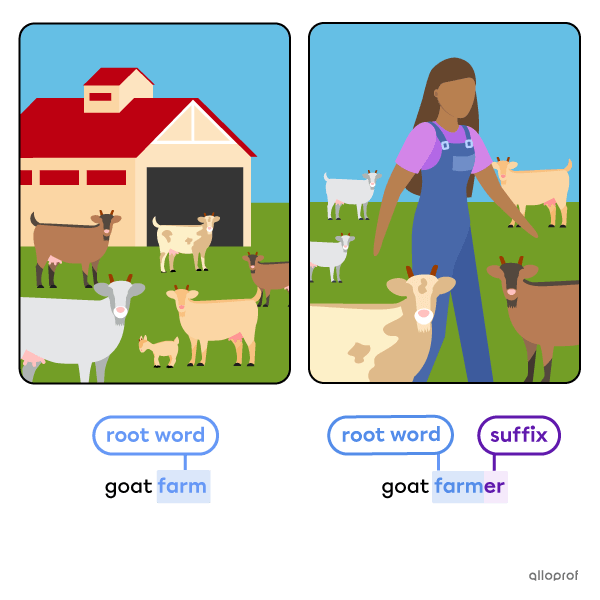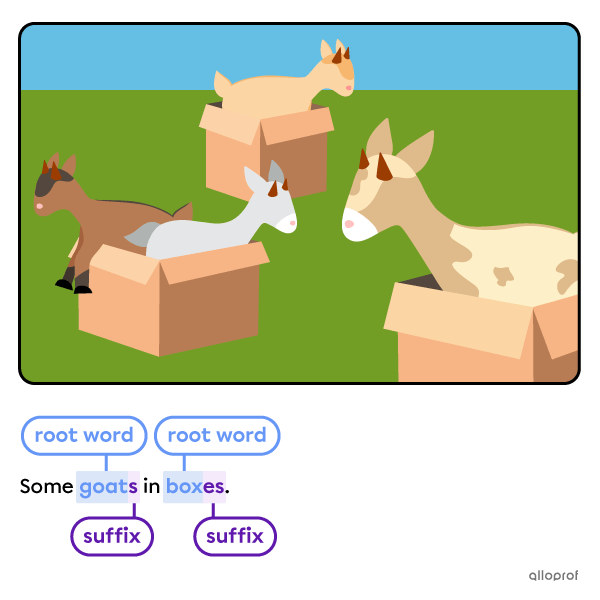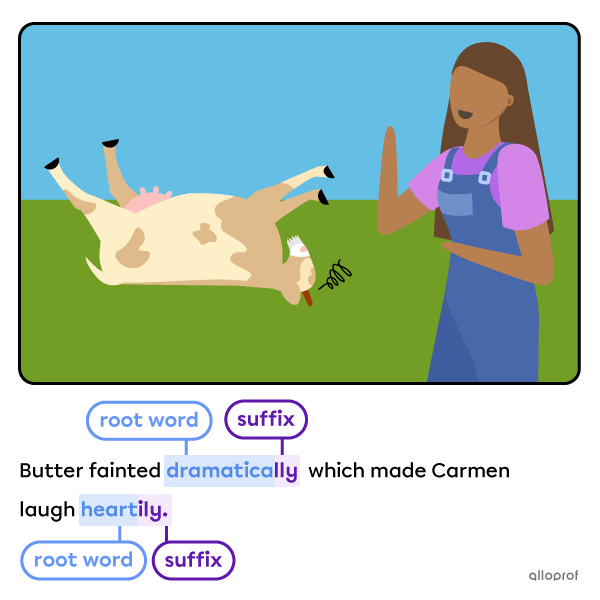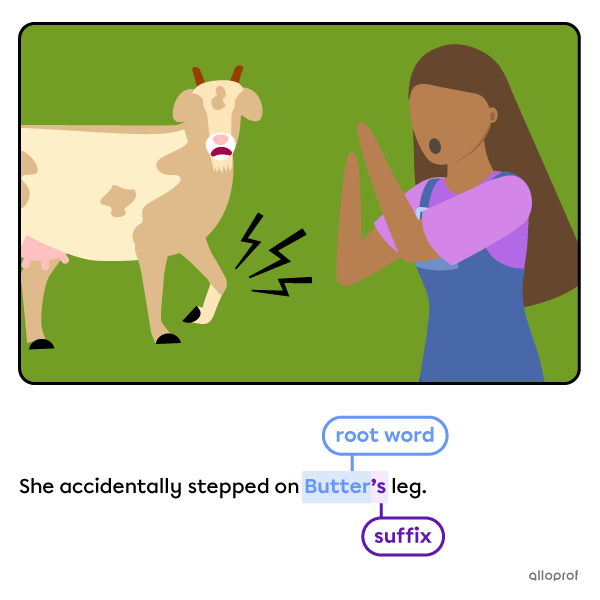A suffix is a letter or group of letters placed at the end of a root word to form a derived word (a similar word with a different meaning).

In some cases, before adding a suffix, a root word’s spelling needs to change.
When adding a suffix that begins with a vowel to a root word ending with the letter -e, remove the -e before adding the suffix.
|
Root words |
Suffixes |
Derived words |
|
use |
-ing |
using |
|
house |
-ing |
housing |
|
store |
-age |
storage |
When a root word ends with the letter -y preceded by a consonant, change the -y for an -i before adding the suffix. To learn more on the spelling of words ending in -y, visit the concept sheet Words Ending in -Y — Spelling Rules.
|
Root words |
Suffixes |
Derived words |
|
happy |
-er |
happier |
|
ugly |
-est |
ugliest |
|
carry |
-ed |
carried |
|
rely |
-able |
reliable |
|
beauty |
-ful |
beautiful |
|
vary |
-ant |
variant |
|
busy |
-ness |
business |
However, when adding the suffix -ing to root words ending with the letter -y preceded by a consonant, keep the -y and simply add the suffix.
|
Root words |
Suffixes |
Derived words |
|
cry |
-ing |
crying |
|
deny |
-ing |
denying |
|
fly |
-ing |
flying |
When adding the suffix -cy to words ending in -t, -tic, -te, and -nt, replace that ending with the suffix.
|
Root words |
Suffixes |
Derived words |
|
idiot |
-cy |
idiocy |
|
lunatic |
-cy |
lunacy |
|
diplomate |
-cy |
diplomacy |
|
inconsistent |
-cy |
inconsistency |
When a suffix is added to words with one syllable, the last consonant of that word needs to be doubled before the suffix is added. To learn more on doubling consonants, visit the concept sheet Double Consonants—Spelling Rules.
|
Root words |
Suffixes |
Derived words |
|
big |
-est |
biggest |
|
step |
-ed |
stepped |
|
let |
-ing |
letting |
Suffixes Used With the Simple Present
Add suffixes to verbs when conjugating them in the third person singular of the simple present.
|
Suffixes |
Used with |
In context |
|
-s |
he |
Carmen pets her goats everyday. |
|
-es |
She watches them on her security camera. |
|
|
-ies |
he |
Carmen cries when she watches animal documentaries. |
Suffixes Used With the Simple Past
Add -d,-ed or -ied to regular verbs when conjugating them in the simple past tense.
|
Suffixes |
Used with |
Examples |
|
-d |
verbs ending in -e |
Carmen liked her dinner. |
|
-ed |
regular verbs not ending in -e or -y |
She fainted when she saw the ghost. |
|
-ied |
verbs ending in -y by changing the last letter for an -i. |
She cried when she saw it. |
Suffixes Used With Participles
Add the following suffixes to regular verbs to create participles.
|
Suffixes |
Used with |
Examples |
|
-ed |
past participle |
All goats have been checked by the vet. |
|
-ing |
present participle |
She has been gardening a lot lately. |
Suffixes Used With Continuous Tenses
Add the following suffixes to verbs to create continuous tenses.
|
Suffixes |
Used with |
Examples |
|
-ing |
present continuous |
Carmen is training the goats. |
|
past continuous |
Carmen was eating dinner when she saw the ghost. |
Add -s or -es to nouns to form plural nouns.

Add the suffix -’s to nouns to show that something belongs to//is part of someone or something.
Add suffixes to numbers to create ordinal numbers.
|
Suffixes |
Used with… |
In context |
|
-st |
1 (first) |
Butter came in 1st place. |
|
-nd |
2 (second) |
Gerald came in 2nd. |
|
-rd |
3 (third) |
Gourmet was 3rd at the finish line. |
|
-th |
4+ (fourth +) |
Somebody else’s goat came in 4th. |
Forming a Noun With an Adjective
Add the following suffixes to adjectives to form nouns.
|
Suffixes |
Adjective |
New noun in context |
|
-ity |
absurd |
The absurdity of the situation made Carmen laugh. |
|
-ness |
red |
The redness of her face got her sister laughing too. |
Forming a New Noun With a Noun
Add the following suffixes to nouns to form new nouns.
|
Suffixes |
Root noun |
New noun in context |
|
-ship |
friend |
Carmen and her goats have a valuable friendship. |
|
-hood |
child |
Carmen and her sister had a wonderful childhood. |
|
-cy |
infant |
But Carmen was often sick during her infancy. |
Add the suffix -self or -selves to pronouns to create reflexive pronouns.
|
Suffixes |
Used with… |
In context |
|
-self |
singular subjects (my, your, her, him, it) |
Carmen takes care of the goats by herself. |
|
-selves |
plural subjects (our, your, them) |
She found them on the side of the road, all by themselves. |
Add the following suffixes to adjectives to create comparative/superlative adjectives.
|
Root words |
Suffixes |
Used at the end of… |
In context |
|
happy |
-ier |
comparative adjectives |
This goat seems happier than that one. |
|
big |
-er |
comparative adjectives |
The goats are bigger than the last time I saw them. |
|
pretty |
-iest |
superlative adjectives |
This is the prettiest goat I’ve ever seen. |
|
gentle |
-est |
superlative adjectives |
These are the gentlest goats I’ve ever seen. |
Add the following suffixes to nouns or verbs to create adjectives.
|
Suffixes |
Root words |
In context |
|
-able |
remark |
Carmen is a remarkable woman. |
|
-ist |
tour |
She once hosted a tourist for a month. |
|
-al |
fiction |
She often falls in love with fictional characters. |
|
-ent |
differ |
Her lifestyle is different from what she imagined for herself. |
|
-ive |
protect |
She is very protective of her goats. |
|
-en |
wood |
She built a wooden barn for them. |
|
-ful |
cheer |
People describe Carmen as cheerful. |
|
-less |
fear |
She is also fearless. |
|
-ic |
hero |
She loves performing heroic actions. |
|
-ous |
danger |
Her heroism can sometimes be dangerous. |

Adding the suffix -ally to the adjective dramatic changes it to an adverb. Adding the suffix -ily to the noun heart changes it to an adverb.
Add -ly, -ily or -ally to adjectives or nouns to change them into adverbs.
Forming a Noun With a Verb
Add the following suffixes to verbs to change them into nouns.
|
Suffixes |
Verb |
In context |
|
-tion |
hibernate |
Goats do not go into hibernation. |
|
-ation |
memorize |
Carmen takes notes to help with memorization. |
|
-ant |
assist |
She does not need an assistant. |
|
-ence |
differ |
When she rescued her goats, Carmen knew she would make a difference in their lives. |
|
-ance |
perform |
Last night, Carmen’s sister’s performance during her show was amazing. |
|
-ment |
replace |
One of the dancers was sick. Her sister had to find a replacement. |
|
-age |
marry |
Carmen once refused to give her hand in marriage. |
|
-ery |
fool |
She thought getting married this young was foolery. |
|
-r |
bake |
Carmen’s mother is a baker. |
|
-er |
work |
She is a hard worker. |
|
-ism |
critic |
But she has difficulty with criticism. |
|
-ry |
bake |
She owns a bakery. |
|
-or |
inherit |
Carmen will be the inheritor. |
